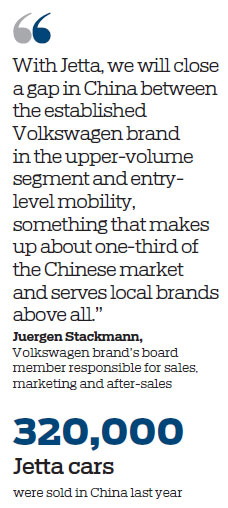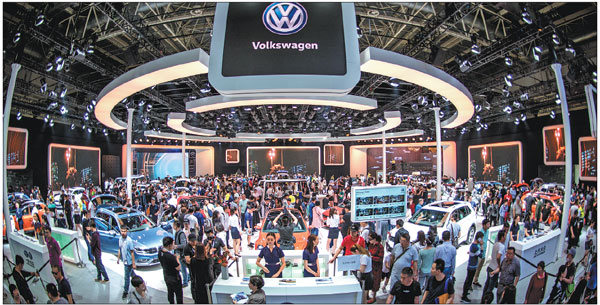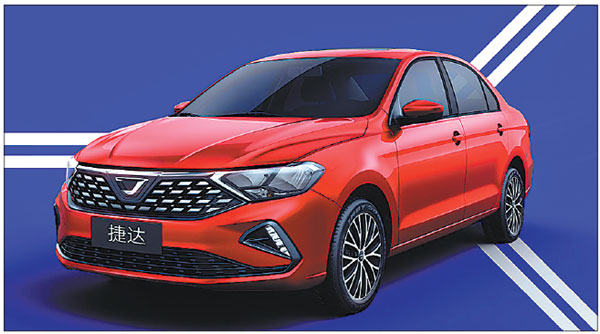Volkswagen set to explore deeper and wider to grow sales in China
German carmaker makes sedan its own marque and forms ties with ride-hailing Didi
In a fast-changing market like China, even a brand as ubiquitous as Volkswagen will not relax for fear of losing hard-won turf, as local carmakers are taking on international rivals and car ownership is threatened by ride-hailing services.
And the best defense is a good offence. Last week, the German carmaker developed its Jetta model into a standalone brand, hoping to get a slice of China's entry-level market by tapping into the model's national success.
"It (Jetta) brought mobility to the masses, just as the Beetle did in Europe," said Juergen Stackmann, Volkswagen brand's board member responsible for sales, marketing and after-sales, in a statement.
Positioned under Volkswagen, Jetta is targeted at the vast number of China's first-time car buyers in smaller cities, who usually choose Chinese or South Korean brands.
According to Jefferies Hong Kong, Great Wall Motor and Geely were among the most popular brands in tier-3 to tier-5 cities in January, with 97 percent of their sales being mid-to-low-end sedans and SUVs.

"With Jetta, we will close a gap in China between the established Volkswagen brand in the upper-volume segment and entry-level mobility, something that makes up about one-third of the Chinese market and serves local brands above all," said Stackmann.
According to Volkswagen, 81 percent of vehicles sold in China's entry-level segment are to people who are buying a car for the first time.
Volkswagen said Jetta is not an economy brand but one that offers "high quality, safety, stable values and a fresh design".
Its target customers will be aged 25-35, modern, family-oriented and open-minded.
Stephan Woellenstein, CEO of the Volkswagen brand in China, said: "The core of the new brand will contain Volkswagen's own DNA and will provide consumers with advanced technology that meets their needs and fits their lifestyles."
The company said that given all of its features, it is "deliberately" positioned above China's average entry-level price of 38,000 to 45,600 yuan ($5,700 to $6,800).
The brand will begin with a lineup of one sedan and two SUVs.
"Sedans continue to be good sellers. But the SUV segment is generating tremendous growth momentum and now makes up nearly 50 percent of the entire (Chinese) market," said the company.
The models will be produced at Chinese joint venture FAW-Volkswagen's plant in Chengdu, Sichuan province. The first model will roll out in the third quarter of this year.
One of the largest carmakers in the country, FAW-Volkswagen is producing models under the Audi and Volkswagen brands.
Jetta is creating its own dealer network and will use different sales formats to appeal to its customers - with digitalized showrooms, promotions in shopping malls and mobile sales trucks, said Volkswagen. They added that about 200 dealers are to offer the new brand by the end of this year.
Jetta's annual sales are to grow to 400,000 by 2021, the Economic Observer quoted a senior executive at FAW-Volkswagen as saying.
It will not be a tough task if customers' good memories of the model that dates back to the 1990s continue. Last year, deliveries of Jetta cars in China totaled 320,000.
Shi Jianhua, a deputy secretary-general of the China Association of Automobile Manufacturers, said the Jetta brand is likely to help Volkswagen expand its market share in China.
Last year, 3.11 million Volkswagens were delivered in China, almost half of its global sales and 13 percent of passenger car sales in the country.
Volkswagen does not limit its efforts to making and selling cars - it has made forays into China's increasingly popular mobility sector.
In December, its joint venture with ride-hailing giant Didi Chuxing Technology Co was established in Shanghai, with Didi holding 60 percent of the stake.
According to the Caixin magazine, Didi has 550 million users, which account for more than 90 percent of China's ride-hailing market, and its drivers offer 30 million rides a day.
The growing popularity of ride-hailing services in congested cities such as Beijing and Shanghai is showing early signs of reduced private car ownership. Joining hands with ride-hailing companies and selling cars to them has become a new option to Volkswagen.
In a statement, Volkswagen Group China said the joint venture explores and develops fleet operation businesses, explaining that it will focus on fleet operations, fleet sales, fleet management as well as repair and maintenance services.
The German automaker will initially manage a fleet of about 100,000 new vehicles for Didi, of which two-thirds will be Volkswagen cars, Reuters quoted a senior Volkswagen source as saying.
The two companies eventually plan to design and develop dedicated vehicles together, it said.
lifusheng@chinadaily.com.cn
|
Models displayed at Volkswagen's stand attract many visitors during the Beijing auto show last year. Provided to China Daily |
|
With the new Jetta brand, Volkswagen intends to explore its market potential in China even more effectively. Provided to China Daily |
(China Daily 03/04/2019 page18)
















